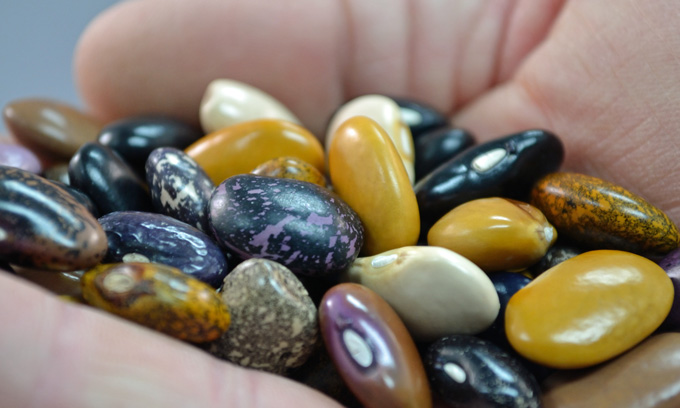If you haven’t started saving seeds from your garden yet, there’s no better time to get started than right now. This handy infographic from the Illinois Stewardship Alliance shows why this is an important part of sustainable growing, and why we should all be doing our part.
The main graphic about the dwindling number of vegetable varieties comes from a National Geographic report about the National Seed Storage Library/National Center for Genetic Resources Preservation. The “80 Years Later” numbers reflect the contents of that national library only – not all varieties that are currently available commercially or through public or private libraries. Nevertheless, the illustration is effective in showing just why we should all take part in protecting the genetic diversity of our food and preserving the heirloom varieties that grow well in our regions.
If you want to get actively involved with a public seed library in your region, check out this interactive map from seedlibrarian.com: Seed Library Locator Map. Hopefully there’s an active library in your area. If you know of a library that’s not listed, get in touch and ask them to add it.
Many thanks to National Geographic for the report on the dwindling number of vegetable varieties in the national library. The original graphic is available here: Our Dwindling Food Variety.
Many thanks to the Illinois Stewardship Alliance for developing this great infographic. The original post is online here: You Should Be Saving Seeds, Yes You.
Infographic Credits:
Content
http://www.exploratorium.edu/gardening/control/seeds/two.html
http://www.fedcoseeds.com/seeds/why_save_seeds.htm
http://www.howtosaveseeds.com/whysave.php
http://blog.seedsavers.org/blog/open-pollinated-heirloom-and-hybrid-seeds
Photos
Infographic: http://ngm.nationalgeographic.com/2011/07/food-ark/food-variety-graphic
Hands with bean seeds photo: http://www.permaculture.co.uk/articles/top-tips-seed-saving
Heirloom tomato photo: https://galerieco.wordpress.com/2014/05/06/heirloom-tomatoes/
Heirloom carrots photo: https://theplantfarm.wordpress.com/tag/tuber/
Seed in hand photo: http://sites.radiantwebtools.com/?i=15934









COMMENTS(2)
Thanks for the research you did on this article.
I love saving seeds. This year I expanded my seed saving from heirloom tomatoes, peppers and sqush in my container garden, to saving edible weed seeds. It is like a surprise party. I discovered a lambs quarters plant that volunteered in my tomato container. I got over 500 seeds from it. I love Lemon Basil, and got a huge supply of seeds from 2 plants. I planted Holy Basil for the first time, and again, got a huge harvest of seed (it is medicinal, hard to find and expensive to buy.) My mint plants, on the other hand, were very stingy with seeds this year.
I neglected the timing for seed harvest on my volunteer borage plant, and only got 12 seeds. But I am hoping to see lots of volunteers in the spring, as most of the seeds had already disengaged from the flowers. Oh, I forgot to mention the dill. I planted one dill plant last year. I had 24 volunteers this spring. I harvested a huge amount of seed from them. I prefer the leaves to seed, but am going to figure out ways of using the seed in cooking since I have more than I would ever use for planting.
What I love most about seed collecting – it is ‘awe-inspiring.’ It reconnects us with the power of nature, and the will to survive.
I guess I should mention, I have no cultivated grass on my lot because it is arid and hot here in the summer, and has a rather short growing season in comparison with other locations. (And I am not watering what is not edible.) This year I paid attention to the weeds on my property, and to my delight, most of them are edible including the tumbleweed that has invaded our area. They self-progagate, and require no attention except to harvest and eat. I will be purchasing more variety of edible weed seeds, and next year I will be harvesting those seeds too.